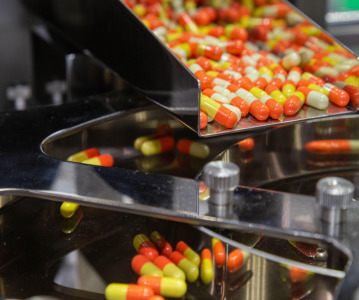Packaging Toward a Sustainable Future

With the world’s attitude to tackling climate change arguably the global number one hot topic of 2019, the issue of sustainability is an emerging theme in pharmaceutical packaging.
In recognition of this developing trend, Pharmapack Europe launched the inaugural Eco-Design Award for the 2019 edition in Paris, in partnership with Adelphe under the Health Product Category, giving packagers the opportunity to showcase innovative packaging solutions that have made significant contributions in terms of reducing waste and increasing potential recyclability.
Traditionally, much of the scrutiny in this area has fallen on consumer and retail industries and rightly so – packaging of items such as food and cosmetics has drawn much criticism for their use of single-use plastic and often overelaborate design.
In the past, pharmaceutical packagers have not prioritized fitting eco-friendliness and sustainability into their manufacturing and distribution process for several reasons. First of all, the value of medicines dwarfs their packaging and logistics costs unlike many consumer goods. Also, the highly regulated sector needs to ensure that its packaging protects and preserves these vital products to ensure efficacy and safety.
As Greg Anderson, managing director of Pharmacentric Solutions and one of the Pharmapack Award judges points out, pharmaceutical packaging is very rarely excessive because firms are trying to make it as cost-effective as possible and also because behind-the-counter treatments do not require attractive packaging in the way consumer healthcare products do.
“Most solid dose packaging is very straightforward, primarily driven by the fact that when you get your prescription, you get it for the medicine, not the brand. It’s behind the counter in the pharmacy therefore you don’t choose it for the nice packaging,” he says.
Drivers of change
So what is driving the packaging industry to take sustainability much more seriously?
Anderson says the shift is partly being driven by drug retailers and hospitals -- payers for large volumes of pharmaceutical products -- who are continually challenging suppliers on how their packaging processes address sustainability.
“Some of the Nordic countries have built in life-cycle analysis of packaging as part as their tender process -- that’s a really forward-looking step,” he says. “And then with medicines that require devices such as inhalers and injectors, hospitals now have sustainability teams starting to look at this in more detail. They are still incredibly small but it’s a start.”
Delphine Pernot, eco-design services manager at Adelphe and another Pharmapack Awards judge, says that increasingly in the healthcare sector, customers are expecting packagers to be aware of environmental issues, display total transparency about their processes and how they are managing sustainability issues.
If packagers want to continue to have a license to operate, they need to satisfy stakeholders they are taking the subject seriously, she says: “Pharma companies’ main purpose is to improve health so if on the other hand, they are damaging the environment, this is not consistent.”
Previous winners
The first of 2019’s two joint winners of the Pharmapack Eco-Design award was Sterile Cosmetics by RPC Bramlage, co-developed with Pierre Fabre Cosmetic, comprising a sterile dispenser and airless container, including bag in bottle technology, allowing patients to dispense sterile cream but without the use of preservatives. The pump is 100% plastic and 100% recyclable.
Pernot says RPC Bramlage and PFC’s innovative design addresses the issue of a small metal component in the pump which was previously problematic for recycling.
“They not only invented a new pump without this metal, but also with a mechanism that ensures against bacterial infection,” she says. “This eco-design initiative has been helpful for them to innovate; they made new packaging which provides additional value.”
Meanwhile, UCB Pharma’s Cimzia 200mg/Vial Lyophilized Powder Pack, co-developed by Rondo, was also awarded an Eco-design award for integrating new and innovative packaging features, focusing on package size, recyclability, sustainability and waste.
Holistic approach
With the deadline for 2020 entries fast approaching, Pernot says judges will be looking for pharmaceutical packaging designs borne out of a completely holistic approach towards their environmental footprint which take into account the entire lifespan of the product and are easier to disassemble.“
For example, are the different plastic and metal parts easy to remove from each other?” she says, adding that companies will also be judged on whether they address sustainability and recycling challenges in the specific markets where their products are sold.
So what are the initial easy wins that drug packagers can achieve on the road to greater sustainability and eco-friendliness?
Anderson is of the view that they need to adopt a top-down approach and engage with all stakeholders from the very beginning: “You have to do a review of your portfolio to identify and prioritize where you can optimize your packaging, based on where you believe your quick wins are, and then in parallel actually look at your whole operation.”
He adds that it is a good strategy to create a sustainability role within the company that talks to customers and then focus on just a few realizable projects.
“Just pick two or three successes, work with your suppliers, and build a short- to medium-term list of goals because the simple rule is if you save carbon, you’ll save money.”
There are additional benefits to such a strategy in the form of increased efficiency and lower costs, he explains: “If you can lightweight one of your bottles or components, it makes it faster to manufacture but it also uses less material, so you’ve got a double advantage there.”
Pernot says companies hesitant to effect change may have to pay a heavier penalty later down the line. Giving the example of replacing PVC in blister packaging with more recyclable materials, she says many manufacturers find it difficult to make this transition, not so much because of technical difficulties but more due to perceived cost constraints.“
The industry should understand and realize there is a big need for changes in their packaging and this will arrive sooner or later,” she says. “If they wait for regulation to come in and they are obliged to change, I believe it will be more expensive for them.”
To learn more about the challenge of creating sustainable pharma packaging solutions, register your interest now for Pharmapack Europe 2021.
Related News
-
News Pharmapack Awards 2024 Patient-Centric Design Award Winner – Dr Ferrer BioPharma
The 2024 Pharmapack Awards celebrated the best in innovation and design for the pharmaceutical packaging and drug delivery industry on January 24, 2024. -
News Women in Pharma: Minding the Gap at Pharmapack 2024
2024 marks the first year Pharmapack will host a Diversity track dedicated to bridging the gap within the pharmaceutical packaging and drug delivery sector. The track includes a panel discussion on 'Enabling Diversity in the Workplace,' focused... -
News Pharmapack Awards 2024 - Celebrating Packaging and Drug Delivery Innovation
The 2024 Pharmapack Innovation Awards ceremony celebrated the best in pharmaceutical packaging and drug delivery innovation at all levels. The awards were held on January 24, 2024 at the Paris Expo Porte de Versailles. -
News 2024 Pharma Industry Trends Outlook: Collaboration, Market Maturity, and Digital Futures
The annual CPHI Online 2024 Pharma Trends Outlook, in partnership with Arvato Systems, identifies 12 key industry trends shaping the life sciences industry in the coming year. -
News New Novo Nordisk AI hub for drug discovery to open in London, UK
Danish pharmaceutical giant Novo Nordisk will be opening an AI-based research facility in the heart of London to advance drug discovery operations. -
News BioNTech to begin mRNA vaccine manufacturing in Rwanda by 2025
German biotechnology company BioNTech has stated their intentions to begin production at their mRNA vaccine factory in Rwanda by 2025, which will mark the first foreign mRNA vaccine manufacturing site on the continent of Africa. -
News Women in Pharma: Looking back on 2023 and moving forward to 2024
In this monthly series, we interview women from across the pharmaceutical industry and supply chain to discuss the importance of gender diversity in healthcare, the workplace, and beyond. -
News CPHI Barcelona 2023: Partnering for Success – Managing Outsourcing Relationships to Optimise Manufacturing Operations
During CPHI Barcelona 2023, insightful content sessions offered attendees the chance to explore trending topics with expert speakers and panellists. Here, we summarise what the pharma industry and supply chain are talking about the most.
Position your company at the heart of the global Pharma industry with a CPHI Online membership
-
Your products and solutions visible to thousands of visitors within the largest Pharma marketplace
-
Generate high-quality, engaged leads for your business, all year round
-
Promote your business as the industry’s thought-leader by hosting your reports, brochures and videos within your profile
-
Your company’s profile boosted at all participating CPHI events
-
An easy-to-use platform with a detailed dashboard showing your leads and performance







